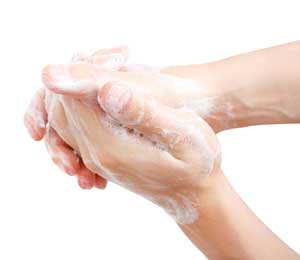 Many people believe that anti-bacterial soaps protect us. This may be in part because consumers are inundated with information from organizations like the Personal Care Products Council, that urges us to believe “that banning anti-bacterial products would increase the level of risk and exposure of the general population to bacteria, leading to increased infection and disease, including 7.5 million cases of food-borne illness and $38 billion in health-care costs annually.” In addition, anti-bacterial soap manufacturers attempt to convince consumers that their anti-bacterial products are “safe and more effective than regular soap.” However, there have been no definitive studies to prove that anti-bacterial products are more beneficial than plain soap and water.
Many people believe that anti-bacterial soaps protect us. This may be in part because consumers are inundated with information from organizations like the Personal Care Products Council, that urges us to believe “that banning anti-bacterial products would increase the level of risk and exposure of the general population to bacteria, leading to increased infection and disease, including 7.5 million cases of food-borne illness and $38 billion in health-care costs annually.” In addition, anti-bacterial soap manufacturers attempt to convince consumers that their anti-bacterial products are “safe and more effective than regular soap.” However, there have been no definitive studies to prove that anti-bacterial products are more beneficial than plain soap and water.
Environmental advocates and new research suggest that anti-bacterial products may be causing more harm than good, producing “superbugs that are resistant to the antibiotics long used to fight them.” Studies on one of the main chemicals in anti-bacterial products, Triclosan, show that “it [Triclosan] can interfere with hormones and cause changes in thyroid, reproductive-growth and developmental systems.” This recent evidence reinforces earlier beliefs that anti-bacterial soaps may not only be killing germs, but also harming us!
This fall, the Food and Drug Administration will review the data on anti-bacterial soaps, and make a final determination on whether they are safe, and whether they are more effective than plain soap and water in preventing illness. If the FDA determines that there are safety concerns, manufacturers may be forced to reformulate their products. Either way, the debate between cleaning-product makers, researchers, and environmental advocates may be finally put to rest.































